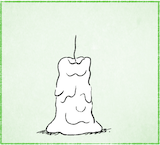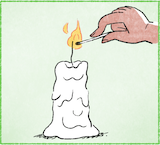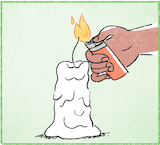


นี้คืออี่หยัง นี้คือเทียน
เทียนแท่งสีขาว มีเทียนแท่งเดียว
เทียนเฮ็ดมาจากอี่หยัง เทียนเฮ็ดมาจาก[ขี้ผึ้ง]*
เทียนใซ้จั่งใด เทียนเอาไว้ถ้าจุด เทียนเอาไว้ถ้าไต้ไฟ
อยู่ในใจกางของเทียน สิมีเส้นด้ายอยู่ เอาไว้ถ้าจุดไฟ หลือเอาไฟมาจุดตงด้ายนี้ แล้วมันกะสิเกิดแสงสะหว่าง
เทียนขั้นจุดแล้ว มันสิให้แสงสะหว่างบ่ ให้อยู่ มันสิให้แสงสะหว่าง
ขั้นจุดเทียนหม้องใด หม้องนั้นกะสิฮุ่ง หม้องนั้นกะสิมีแสงสะหว่าง เฮ็ดให้บ่มืด
2
เขากำลังเฮ็ดหญัง เขากำลังไต้เทียน เขาใซ้ไม้ขีดไต้เทียน
ไม้ขีดอี่หยัง กะไม้ขีดไต้เทียน ไม้ขีดมันสิมีไฟอยู่ในไม้ขีด ขั้นเอาไม้ขีดนี้ไปไต้เทียนแล้ว เทียนกะสิติด เทียนกะสิเห็นฮุ่ง
ไม้ขีดเฮ็ดมาจากอี่หยัง ไม้ขีดเฮ็ดมาจากไม้
แล้วอยู่หัวไม้ขีด สิมีเซื้อเพิงอยู่ เฮ็ดให้มีไฟ หลือสามาดจุดไฟได้
ไม้ขีดอันหนึ่ง ใซ้ได้เที่ยหนึ่ง บ่สามาดใซ้ได้หลายเที่ย
เทียนขั้นเฮาใซ้งานไปเลี้ยยๆ แล้ว หลือใซ้งานโดนๆ แล้ว มันสิเบิดเป็นบ่ เบิดเป็นอยู่
เทียนขั้นเฮาใซ้งานไปเลี้ยยๆ มันกะสิละลาย มันกะสิเปี่ยยไปเลี้ยยๆ แล้วมันกะสิเบิดไป
ตอนนี้จุดเทียนแล้ว เทียนมันให้แสงสะหว่างแม่นบ่ แม่นอยู่ เทียนมันให้แสงสะหว่าง ตอนนี้มันกำลังเห็นฮุ่งอยู่
3
เขากำลังเฮ็ดหญัง เขากำลังไต้เทียน
เขาเอาอี่หยังไต้เทียน เขาเอาไฟแซ็กไต้เทียน
ไฟแซ็กเป็นจั่งใด ไฟแซ็กเป็นเซื้อเพิง มีเก่ดอยู่ในไฟแซ็กอันนั้น สามาดเฮ็ดให้ไฟติดได้ สามาดเฮ็ดให้มีไฟได้ แล้วกะสามาดไต้เทียนได้
ไฟแซ็กเฮ็ดมาจากอี่หยัง ข้างนอกไฟแซ็กเฮ็ดมาจากพะสะติก แล้วข้างในไฟแซ็กนั้นสิมีเก่ดอยู่
ไฟแซ็กใซ้ได้โดนบ่ ใซ้ได้โดนอยู่ ใซ้ได้หลายเที่ย โดนบักคักหนึ่ง
ไฟแซ็กมีเปวไฟแม่นบ่ แม่น ไฟแซ็กมีเปวไฟ เพาะว่าไฟแซ็กมันมีเก่ดอยู่ มันกะเลยเฮ็ดให้มีเปวไฟได้
*should be LF-LF, probably interference from standard Thai
Link to overview page
Link to dictionary
| Isaan | Pronunciation | Tones | Thai | English/Notes |
|---|---|---|---|---|
| นี้ | ni: | HF | นี้ | 1. this 2. here |
| คือ | khʉ: | HR | คือ | 1. to be, to resemble, like, as 2. why {บักหล้าคือบ่เก็บโต่ะแน่ = [addressing a young boy] Why haven't you cleared the table?} |
| อี่หยัง | i:-yaŋ | H-M | อะไร | 1. what {นี้คืออี่หยัง = What is this?} {มื้อนี้เจ้าเฮ็ดอี่หยัง = What are you doing today?} {กินเข้างายกับอี่หยัง = What did you have for breakfast?} 2. something, anything, (in negations) nothing {บ่ต้องเฮ็ดอี่หยังอีกเลยนอกจากใส่ปุย = [we] don't need to do anything besides adding fertilizer} |
| เทียน | thi:an | HR | เทียน | candle |
| แท่ง | thɛŋ | H | แท่ง | clf. for candles, pens |
| สี | si: | M | สี | 1. color 2. colored pencil, crayon |
| ขาว | kha:o | M | ขาว | white |
| มี | mi: | HR | มี | 1. to have 2. there is |
| เดียว | di:ao | M | เดียว | only, alone, single |
| เฮ็ด | het | H | ทำ | to do, to make |
| มา | ma: | HR | มา | 1. to come 2. auxiliary expressing action towards the present or focal time {กะคุเฮ็ดมาจากอี่หยัง = What is the bucket made of?} {แล้วเขากะเก็บเงินจากพุนั้นมา = and then she takes the money of that person} |
| จาก | ja:k | LF | จาก | 1. from {... เฮ็ดมาจากอี่หยัง = ... is made from what?} 2. to depart |
| ขี้ผึ้ง | khi:-pʉŋ | LF-LF | ขี้ผึ้ง | wax |
| ใซ้ | sai | HF | ใช้ | to use |
| จั่งใด | jaŋ-dai | H-M | ยังไง, แบบไหน | how, in what manner {บักนาวมันมีลดซาดจั่งใด = Lime fruits have what kind of taste?} {เขาปิดแอจั่งใด = How is he switching off the A/C?} {เทียนใซ้จั่งใด = How's a candle used?} {สิใซ้จั่งใด = how is [it] used?} |
| เอา | ao | M | เอา | to take, to give {เขากำลังเอาก่องไปซั่ง = he's taking the boxes to weigh them} {หมอกำลังเอายาให้คนป่วยกิน = the doctor is giving medicine to the patient} {เอาไว้ถ้า = is for, is used for, has the purpose of} |
| ไว้ถ้า | wai-tha: | HF-LF | usually in a positive statement or answer: is for, is used for, has the purpose of {กะทะมีไว้ถ้าทอด = a pan is for frying} {น้ำบักนาวมีไว้ถ้าปุงอาหาน = lime juice is used to season food} {ปากกามีไว้ถ้าเขียน = a pen is for writing} {กะเทียมเอาไว้ถ้าเฮ็ดแนวกิน = garlic is used to make food} {ขาเอาไว้ถ้าญ่าง = legs are for walking} {เกิบเอาไว้ถ้าใส่ = shoes are for wearing} Notes: see also ไว้ |
|
| จุด | jut | M | จุด | 1. to light sth. {จุดธูป = to light an incense stick} {จุดเทียน = to light a candle} 2. point, place {จุดเป้าหมาย = destination (e.g., of a trip)} |
| ไต้ | tai | HF | เทียน: จุด | candle etc.: to light {เขาใซ้ไม้ขีดไต้เทียน = he lights the candle with a match} |
| ไฟ | fai | HR | ไฟ | 1. fire, flame 2. electricity, power 3. light |
| อยู่ | yu: | H | อยู่ | 1. to be (located) at 2. yet, still 3. auxiliary indicating continuous or progressive action {ทอดปาอยู่ในกะทะ = (in the process of) frying a fish in the pan} {แม่กำลังเมี้ยนเฮียนอยู่ = mother is cleaning/tidying up the house} |
| ใน | nai | HR | ใน | in, within |
| ใจกาง | jai-ga:ŋ | M-M | ใจกลาง | center |
| ของ | khɔ:ŋ | M | ของ | of, belonging to |
| สิ | si | M | จะ | future tense auxiliary {เขากำลังสิตื่น = he's about to wake up} {สิไปตะหลาด = [I'm] going to the market} |
| เส้น | sen | LF | เส้น | 1. string, thread 2. line 3. clf. for noodles, strings, threads, lines |
| ด้าย | da:i | HF | ด้าย | (cotton) thread |
| หลือ | lʉ: | M | หรือ | or |
| ตง | toŋ | M | ตรง | 1. at 2. to be precise at, to be exact {ห้าโมงตง = exactly five o'clock} 3. straight |
| แล้ว | lɛ:o | HF | แล้ว | 1. finished 2. already 3. and then, and next (especially แล้วกะ) 4. auxiliary for past tense |
| มัน | man | HR | มัน | it (also used to refer to people) |
| กะ | ga | M | ก็ | 1. then, consequently 2. also |
| เกิด | gə:t | LF | เกิด | 1. (often together with ขึ้น) to happen, to arise, to take place {เกิดอี่หยังขึ้น = what is happening?} {บ่มีหญังเกิดขึ้น = nothing's happening} 2. to be born 3. to grow {หนวดกะคือสิเกิดอยู่ใต้ดัง = a moustache grows below the nose} |
| แสง | sɛ:ŋ | M | แสง | light |
| สะหว่าง | sa-wa:ŋ | M-H | สว่าง | bright, shining |
| ขั้น | khan | LF | เมื่อ | when, if |
| ให้ | hai | LF | ให้ | 1. to give {หมอกำลังเอายาให้คนป่วยกิน = the doctor is giving the patient medicine} 2. for 3. to allow, to be allowed |
| บ่ | bɔ: | H | ไม่ | 1. no, not 2. question particle, transforming a statement into a question Notes: spelling exception in line with common usage on social media |
| หม้อง | mɔŋ | LF | ที่, แห่ง, บริเวณ | 1. place, area {หลายที่หลายหม้อง = in many places} {หม้องใดหม้องหนึ่ง = some place} 2. clf. for places |
| ใด | dai | M | ใด | 1. which, that one which, what, how {เขานั่งแบบใด เขานั่งขดตะหมาดอยู่ = How is he sitting? He's sitting cross-legged.} {ตอนใด = when?} 2. whichever, whoever {หม้องใดหม้องหนึ่ง = some place, somewhere} {ขั้นเฮาอยากตื่นญามใด เฮากะตั้งเวลาปุกญามนั้น = If we want to get up at a certain time, we set the alarm to that time} Notes: sentence-final often with a marked rising tone |
| นั้น | nan | HF | นั้น | that, there |
| ฮุ่ง | huŋ | H | 1. light (adj), bright 2. to have light, to be not dark |
|
| มืด | mʉ:t | HF | มืด | dark |
| เขา | khao | M | เขา | personal pronoun: he, she |
| กำลัง | gam-laŋ | M-HR | กำลัง | auxiliary indicating continuous or progressive action |
| หญัง | ɲaŋ | M | อะไร, เป็นหญัง = ทำไม | 1. what {เขากำลังเฮ็ดหญัง = What is he doing?} {ธูปเอาไว้เฮ็ดหญัง = What are incense sticks for?} 2. something, anything, (nothing) 3. เป็นหญัง[...]คือ in initial position: why {เป็นหญังเขาคือใส่บักพิกลงไปในกวยเตียว = Why is he putting chili in [his] noodle soup?} {เป็นหญังหน้าต่างมันคือเปิด = Why is the window open?} {เป็นหญังมันคือมีควนไฟ = Why is there smoke?} |
| ไม้ขีด | mai-khi:t | HF-LF | ไม้ขีด | match |
| ไป | pai | M | ไป | 1. to go 2. auxiliary indicating action extending into the future |
| ติด | tit | M | ติด | to light, to ignite {ขั้นบ่กดปุ่ม มันกะบ่ติด = [of a device or appliance] if you don't press the button, it won't start} |
| เห็น | hen | M | เห็น | to see |
| ไม้ | mai | HF | ไม้ | wood, tree |
| หัว | hu:a | M | หัว | 1. head 2. clf. for onions, bulbs of garlic |
| เซื้อเพิง | sʉ:a-phə:ŋ | HF-HR | เชื้อเพลิง | fuel, combustible, kindling Notes: the vowel เอือ is likely to be a Thai loan |
| สามาด | sa:-ma:t | M-HF | สามารถ | can, to be able |
| ได้ | dai | HF | ได้ | 1. can 2. to get, to obtain 3. before verb: indicating past tense 4. บ่ได้ + verb: not |
| อัน | an | M | อัน | 1. thing, object 2. general clf. for objects |
| หนึ่ง | nʉŋ | H | หนึ่ง | 1. one 2. after adjective: intensifier {บักคักหนึ่ง = very much} {อันบักใหญ่หนึ่ง = very large}, or attenuates the meaning {กะดาดมันแผ่นน้อยๆ หนึ่ง = the piece of paper is [relatively] small} |
| เที่ย | thi:a | H | ครั้ง, เที่ยว | clf. for times, rounds {บางเที่ย = sometimes} |
| หลาย | la:i | M | เยอะ, มาก | many, much, very |
| เฮา | hao | HR | เรา | 1. personal pronoun: we 2. personal pronoun: I |
| ใซ้งาน | sai-ŋa:n | HF-HR | ใช้งาน | to use, to put to use |
| เลี้ยยๆ | li:ai | HF | เรื่อยๆ | continuously Notes: pronunciation: also realized as เลื้อยๆ |
| โดน | do:n | M | นาน | time: long |
| เบิด | bə:t/bət | LF/M | หมด | 1. completely, totally, entirely {เทิงเบิด = all of them} {เบิดมื้อเบิดค่ำ = [all] day and night} {ขั้นพุโดยสานลงลดไฟเบิดแล้ว [...] = when all passengers have disembarked […]} {เขากินเบิดบ่ = Has he eaten all of it?} 2. to be finished, to be exhausted, to come to an end, to have no more {โน่ดบุ่กแบ็ดเบิด = the notebook is out of battery/the notebook needs recharging} |
| เป็น | pen | M | เป็น | 1. to be, to exist 2. to be able to 3. to suffer, sth. happens to 4. เป็นหญัง[...]คือ in initial position: why? {เป็นหญังเขากะคือแปงฟัน = Why is he brushing his teeth?} {เป็นหญังเคี่ยงบินมันคือสิตก = Why is the airplane falling down?} |
| ละลาย | la-la:i | H-HR | ละลาย | to melt |
| เปี่ยย | pi:ai | H | เปื่อย | to disintegrate, to decompose, to rot, to decay |
| ตอนนี้ | tɔ:n-ni: | M-HF | ตอนนี้ | now |
| แม่นบ่ | mɛ:n-bɔ: | H-H | ใช่ไหม | question particle: ..., right? ..., isn't it? ..., don't you? etc. {เจ้าได้เห็นสิ่งนั้นแม่นบ่ = You've seen that, haven't you?} {ฝนกำลังตกแม่นบ่ = It's raining, isn't it?} {นี้คือกะคุแม่นบ่ = This is a bucket, isn't it?} |
| แม่น | mɛ:n | H | ใช่ | 1. yes 2. affirmative particle |
| ไฟแซ็ก | fai-sɛk | HR-H | ไฟแช็ก | lighter {เขาใซ้ไฟแซ็กไต้เทียน = he lights the candle with a lighter} |
| เก่ด | get | H | แก๊ส | gas |
| ข้างนอก | kha:ŋ-nɔ:k | LF-HF | ข้างนอก | outside |
| พะสะติก | pha-sa-tik | H-M-M | พลาสติก | plastic |
| ข้างใน | kha:ŋ-nai | LF-HR | ข้างใน | inside |
| บักคักหนึ่ง | bak-khak-nʉŋ | M-H-H | intensifier: very, very much (variant of คัก) | |
| เปวไฟ | pe:o-fai | M | เปลวไฟ | flame |
| เพาะว่า | phɔ-wa: | H-H | เพราะว่า | because |
| เลย | lə:i | HR | เลย | 1. futher on, beyond, past {เข็มน้อยเลยเลขสิบสองไป = the minute hand has passed number twelve} 2. too much 3. at all 4. definitively 5. completely, utterly |